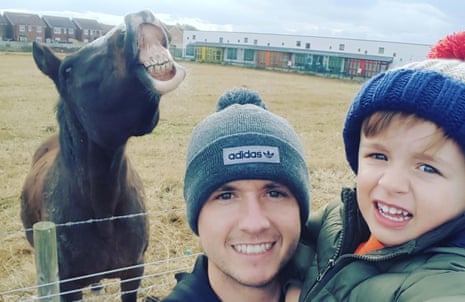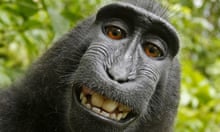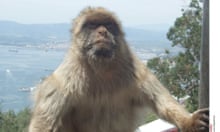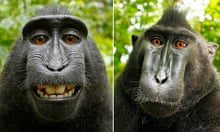Betty the horse may be grinning, but her owners have been left with long faces after the animal won a father and son a family holiday – by photobombing their selfie. David Bellis and his three-year-old son, Jacob, were walking near their home in Prestatyn, north Wales, when they snapped a self-portrait – only to discover Betty had entered the frame and was posing in the background with what looked like a smile.
David entered the picture in a competition run by Thomson Holidays and won a £2,000 break, but now the horse’s owner is complaining to the company, because she was not asked for permission, and because Betty had been trained to stick out her tongue.
It may sound petty but it’s not the first time an animal selfie has caused a row. Wildlife photographer David Slater finally had a legal claim by animal-rights group Peta dismissed after the organisation claimed a monkey owned the intellectual property rights to some of his pictures.
In 2011, Slater was photographing crested black macaques in Indonesia when one grabbed his camera. Media organisations argued they could reprint the resulting photographs for free because the copyright was owned by the monkey, not Slater. Peta then filed a lawsuit to administer all proceeds from the photos for the benefit of the monkey, which it identified as six-year-old Naruto.
Monkey business like this is becoming common enough for clarification to be needed around the law, according to Alicia Mendonca from Farrer & Co solicitors. She explains that although the photographer had brought and set up the camera for the picture, and created the situation where the the artwork became possible, it was argued that it was the monkey who “turned the camera around, made a funny face and took a picture – so the artwork was the result of the monkey’s own actions.”
In the end, the judge ruled that while the monkey may have deliberately taken the picture, animals cannot own copyright – and dismissed the case. Betty’s owners are unlikely to get so far, says Mendonca. “The horse is just in the photograph, not taking it,” Mendonca points out. “You could try to say the horse deliberately pulled the funny face – but then the horse would own the copyright, not the owner.”
“I don’t know if we will get to the point where we need legislation,” she adds, “but we might do what they have done in the US – where the intellectual property office issues guidance.
“In the UK, I think they would say animals can’t have copyright – we would get into difficult territory if we try and work out when an animal did and did not intend to create art.”
- The still photograph of the monkey was removed from this article on 2 August 2017, because the rights are under dispute.








Comments (…)
Sign in or create your Guardian account to join the discussion